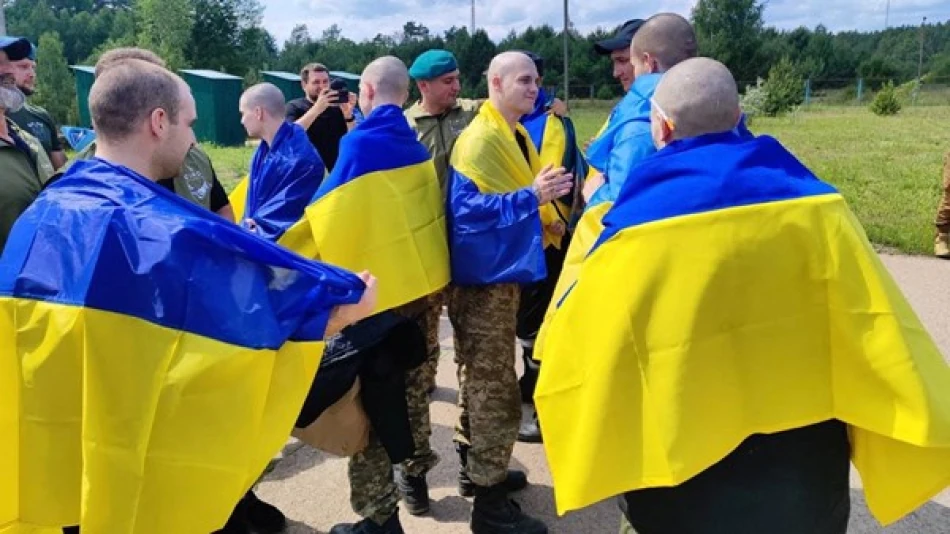
Landmark Russia-Ukraine Prisoner Swap: Hundreds to be Exchanged in Historic Agreement
Ukraine and Russia Edge Closer to Major Prisoner Exchange Deal Involving 1,200 Captives
Ukrainian President Volodymyr Zelensky confirmed Sunday that negotiations are advancing on a significant prisoner exchange with Russia, involving a list of 1,200 names discussed during direct talks in Istanbul. The development signals potential progress in one of the few remaining diplomatic channels between the warring nations, as both sides seek to repatriate captured military personnel and civilians amid the ongoing conflict.
Istanbul Talks Bear Fruit After Months of Negotiations
The prisoner exchange framework emerged from direct negotiations between Russian and Ukrainian representatives in Istanbul on July 23, marking a rare instance of face-to-face diplomacy since the conflict escalated. Zelensky's confirmation via Telegram follows a meeting with Ukraine's chief negotiator Rustem Umerov, indicating that both military personnel and civilians will be included in the proposed exchange.
While Russia had previously mentioned the 1,200-person figure during the Istanbul discussions, Ukraine had remained silent on specific numbers until now. The acknowledgment suggests both sides are moving beyond preliminary discussions toward concrete implementation.
Humanitarian Corridor Remains Active Despite Military Escalation
The prisoner exchange mechanism has proven to be one of the most durable aspects of Ukraine-Russia relations since February 2022. According to Zelensky's July statements, Ukraine has successfully repatriated 5,857 individuals through formal exchange agreements, with an additional 555 released through other arrangements.
The most recent exchange occurred in July under an interim agreement reached in Istanbul in late June, which established the framework for the current 1,200-person swap. This pattern of regular exchanges demonstrates both nations' recognition that maintaining some diplomatic channels serves their strategic interests, even as military operations intensify.
Strategic Implications Beyond Humanitarian Concerns
For Ukraine, prisoner exchanges serve multiple purposes beyond the obvious humanitarian imperative. Returning experienced military personnel strengthens Ukraine's defense capabilities, while civilian releases provide powerful propaganda value and maintain domestic support for the war effort. Each successful exchange also validates Zelensky's negotiating position and demonstrates his government's commitment to bringing citizens home.
Russia's participation in these exchanges suggests Moscow recognizes the value of maintaining minimal diplomatic engagement. The exchanges provide Russia with opportunities to retrieve its own personnel while projecting an image of reasonableness to international observers, potentially complicating Western efforts to isolate the Kremlin diplomatically.
Precedent from Other Conflict Zones
The Ukraine-Russia prisoner exchange model mirrors successful frameworks from other prolonged conflicts. During the Iran-Iraq War of the 1980s, both nations maintained prisoner exchange mechanisms even during the most intense fighting periods. Similarly, India and Pakistan have historically conducted prisoner releases despite ongoing tensions over Kashmir.
However, the scale and regularity of Ukraine-Russia exchanges appear more systematic than many historical precedents, suggesting both sides view these arrangements as essential to their broader war strategies rather than merely humanitarian gestures.
Uncertain Timeline Reflects Broader Diplomatic Challenges
Zelensky's announcement that preparations are underway for another meeting with Russian representatives, without specifying timing, reflects the delicate nature of these negotiations. The absence of a concrete timeline suggests that despite apparent progress, significant logistical and political hurdles remain.
The constantly changing number of prisoners held by both sides, as acknowledged by Ukrainian officials, complicates the exchange process. New captures occur regularly as military operations continue, requiring continuous updates to prisoner lists and exchange ratios. This dynamic environment makes large-scale exchanges both more urgent and more complex to execute.
Most Viewed News

 Layla Al Mansoori
Layla Al Mansoori






